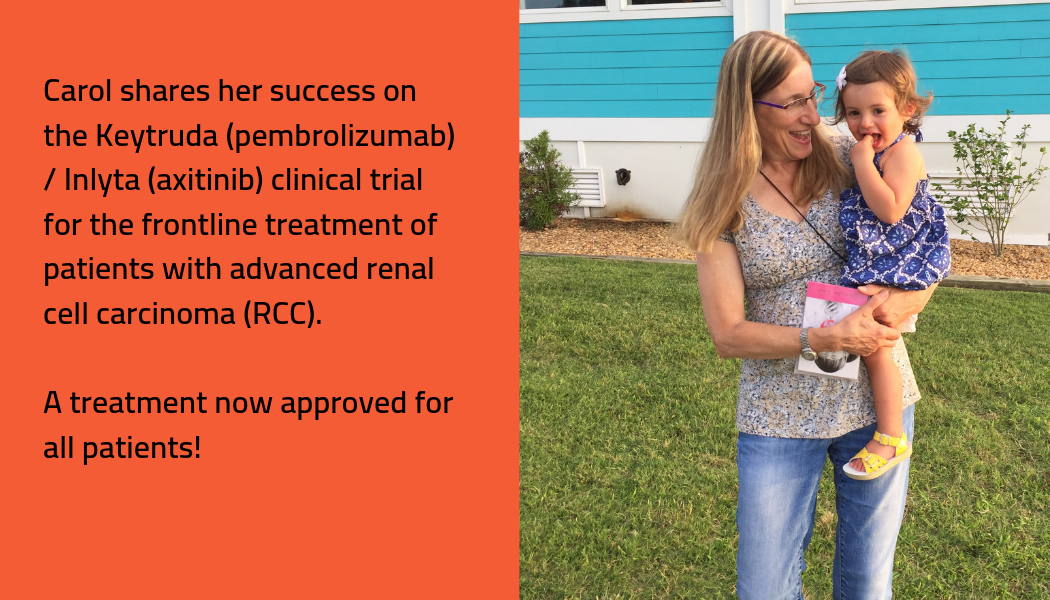In April 2019 the Food and Drug Administration (FDA) approved Keytruda (pembrolizumab) in combination with Inlyta (axitinib) for the frontline treatment of patients with advanced renal cell carcinoma (RCC). We’re grateful to brave patients like Carol who participated in a clinical trial and helped make this treatment a reality for advanced RCC patients.
I have been retired for more than 5 years. I have always been a person with a lot of energy. In fact, I used to teach 3rd grade in an all boys school. Energy needed there!
In the fall of 2016, I began to have terrible night sweats, changing many times a night, and was just exhausted. I went to my primary doctor who knows I’m not a complainer. She could tell my lymph nodes were swollen and began doing tests.
At first, lymphoma was suspected. I had a biopsy right after Thanksgiving 2016, thanks to a friend who had connections to the surgeon. My primary doctor was interested in getting things done quickly, but the oncology department at the cancer center did not seem so. My friend was able to move me up. The biopsy showed RCC.
The renal oncologist we met with several weeks later, and yes, I was going nuts, offered me treatment with Sutent and sent me home with a stack of information about drugs, etc.
Luckily, close friends in the medical field urged me to get a second opinion. One of my friends, who is a pathologist, noted that my pathology report was incomplete. I took their advice and decided to go to Fox Chase Comprehensive Cancer Center.
We got an appointment at Fox Chase almost immediately and met Dr. Zibelman. I recognized his energy and enthusiasm and I was delighted. He had the pathology report and right away noted the missing information. He said they would request the slides from the other hospital and that if the pathology showed I had clear cell RCC, that I might qualify for a promising clinical trial combining immunotherapy with a targeted treatment. I was impressed with Fox Chase and the fact that they wanted to get on this immediately.
The good news was that I did have some clear cell and I was randomized into the treatment arm of the Keytruda in combination with Inlyta trial. I started Inlyta and Keytruda within a week or two.
For the first month or so, I was fine. After that I began to have the hand, foot, and mouth sores. Dr. Zibelman lowered my dosage and they began to heal. It took about 6 months from the time of beginning treatment until the blisters/burns went away. I have learned to manage the symptoms when they return and Doc Z lets me determine when I need a break. I also had some muscle aches, which may have been from the Keytruda. I have had hoarseness for months and am about to see an ENT about it. The treatment has also not been kind to my thyroid. They put me on Synthroid for that, but that dosage has been lowered recently. The Inlyta raises blood pressure, but that is well controlled with drugs. Also, I have lost most of my ability to taste sweet, which is annoying, but can be dealt with.
When we began, my lymph nodes were swollen right up into my neck. That’s where the biopsy was taken. At two + years in, my kidney tumor has shrunk about 33%. The lymph nodes in my neck and under my arms can no longer be felt. My energy is pretty good, although not what it used to be. I haven’t restricted activities.
years in, my kidney tumor has shrunk about 33%. The lymph nodes in my neck and under my arms can no longer be felt. My energy is pretty good, although not what it used to be. I haven’t restricted activities.
The Keytruda part of the trial finished at the two year mark and now I am just on Inlyta. Each scan shows a tiny bit of shrinkage, but that is at least in the right direction. If I backslide, they will bring back the Keytruda.
My biggest recommendations are get a second opinion and listen to your body.

